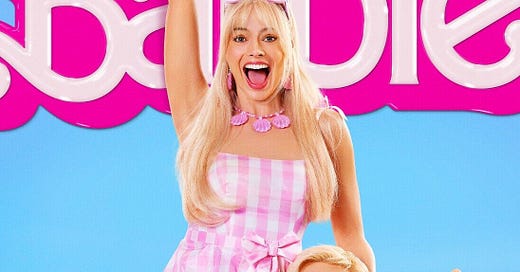Greta Gerwig’s billion-dollar Barbie is an unwitting and hilarious send-up of feminist indoctrination.
Liberal moms will describe Barbie as “empowering” and “uplifting,” but that misses the point. We're no longer living in a throwback feminist world. Barbie is a fantasy of a feminist world long gone.
Oh, Greta Gerwig, what I am to do with your billion-dollar Barbie? First, kudos to you and your life/writing partner Noah Baumbach for managing to jam four years’ worth of women's studies pablum into a mainstream musical comedy about a plastic toy made by slave labor in Asia. Your Stereotypical Barbie (the always meticulous Margot Robbie) is perfectly cast. The sets are fabulous. The cheery, creepy matriarchal Sparta you call Barbie Land is brilliantly frightening. The cheeky little jokes about flat-fleet, cellulite, and blonde fragility are spot on. And like a set piece written by Bella Abzug, with an assist from Gloria Steinem, the triumphant soliloquy of your Ordinary Barbie (America Ferrera) about how just so darn tough it is to be a woman was endearing and persuasive, if otherwise out of place in a movie that, wittingly or not, sends up every trope of female liberation.
Unfortunately, your depictions of Ken, The Kens, and “The Patriarchy”––while laugh-out-loud funny––are preposterously simplistic. It’s disappointing to think that this is how a mature female filmmaker thinks of men and the dead horse of “toxic masculinity” circa 2023 when women are dominating or will soon be dominating in almost every sphere. Yes, there are plenty of moronic, internally homophobic, rap-listening, misogynistic knuckleheads still roaming our cities, breaking into department stores, rioting, and looting based on lies about policing, and theft as “reparations.” But out in the suburban hinterlands, their fellow travelers are committing de facto hari-kari after decades of anti-male indoctrination so crushing that many otherwise-normal boys feel they must switch to the opposite gender to get recognition or become so ultra-sensitive they are indistinguishable from most women.
In a movie so transparently misandrist, I doubt it was Gerwig’s intention for audiences to come away loving Ken, The Kens, or her laughably mindless depiction of male power. But we do. In a movie designed to inject lesbian separatist dogma straight into the brains of unsuspecting young girls, The Barbies in Barbie seem righteous, one-dimensional, and boring, while The Kens seem sympathetic, rounded, and fun. Ryan Gosling as the main Ken, whose only real job is overseeing “Beach,” steals the show.
Still, Barbie is a hilarious if preachy first attempt by a genuine auteur––see Gerwig’s glorious Lady Bird––to navigate the upside-down insanity of today’s Woke-Industrial Complex. No doubt earnest liberal moms will describe Barbie as “empowering” and “uplifting,” but that misses the larger point. We are no longer living in a throwback feminist world. Barbie is a fantasy of a feminist world long gone. Contrary to the film’s contention, nearly half of Mattel’s board seats are occupied by women. Meanwhile, today’s gender-bending mumbo-jumbo has made life much more difficult for traditional feminists, who fought successfully for women’s equality only to see hyper-aggressive transgender “women” steal their thunder and up-end their agenda.
Even on its own retro terms, Gerwig’s throwback feminism cannot answer the fundamental quandaries that “heteronormative” girls still have. After all the indoctrination from Simone de Beauvoir, Judith Butler, and Angela Davis, the properly groomed Oberlin Riot Grll still asks, “Why I am attracted to Ken when I have been fully indoctrinated to hate him?” Moreover, when hard-charging men have become culturally verboten in a media world infected with Trump Derangement Syndrome, is it any wonder that many twenty-something boys are still living at home with mom, suppressing their will to power through porn, weed, and video games? Failure to launch is the new “Pan-demic.”
Today’s pierced, tatted, and purple-haired Rosa Luxemburgs and their pimpled incel counterparts alike ask, “Why do I want to earn a living, pursue excellence, and defend my country when I have been taught that capitalism is evil and America is racist?” Movies like Barbie don’t solve these riddles, they compound them. And that’s because Marxist gender bromides failed in the 60s, 70s, and 80s, and will fail now. Feminism’s war on stereotypical Barbie-style beauty is over. The plethora of young women who dress as ugly as possible proves their pyrrhic triumph over the Mattel monoculture. #Me-Too won. Men are scared, very scared.
But the answer to being human, let alone fighting off objectification, is not in deliberate ugliness or in reversing “structures of power,” as the desiccated Marxist falsely promises. It lies in exploring deeper, more nuanced, and ineffable truths found in the classics of world art, literature, philosophy, politics, and religion––far beyond what economics, law, and plastic toys can codify.
While the movie Barbie fails to make this obvious point, a world run entirely by women is as terrifying as one dominated by men. Though mass left-wing culture has made the two sexes more Balkanized than ever, in truth, men are not “superfluous,” nor are women any better when given absolute power. Barbie critiques norms and institutions that foster disempowerment but offers no way out of the eternal question, “Why do I love him?” let alone “Why do I have to change my gender, or date the same sex, to feel liberated?”
Good questions for the billion-dollar Barbie sequel. Yay!




